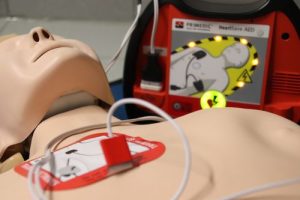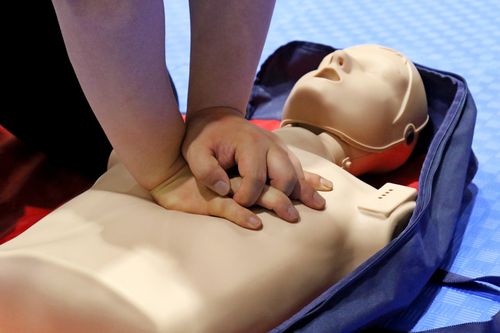Training Courses

Basic Life Support
The goal of this Basic Life Support course is to equip you with the skills necessary to respond swiftly and appropriately in emergency situations, thereby improving patient safety and care quality.
You will gain essential knowledge from this training on how to provide potentially life-saving assistance. It teaches you how to evaluate circumstances using primary and secondary surveys, how to respond to a range of emergencies including choking or anaphylaxis, and how to perform procedures like cardiopulmonary resuscitation (CPR) and the recovery position.

Emergency First Aid at Work
This course covers a lot of the same ground as the basic first aid training course, however, the great additional benefits of this course is that it is more in-depth, and also covers treatment for a wide range of injuries and illnesses.
Students will acquire the first aid skills and confidence necessary to assist those who are: unresponsive; bleeding; experiencing shock; choking; feeling lightheaded; suffering from hypothermia or heat exhaustion; poisoning; suffering from burns; suffering a head injury; or suffering from a bone or muscle injury.
Additionally, learners will be able to support those who are experiencing a:
seizure, angina attack, heart attacks, strokes, severe allergic reactions, asthma attacks, as well as diabetic difficulties.
Information on electrical incidents, accident recording and reporting, monitoring casualties, assessing casualties, and the laws governing the use of substances dangerous to health (COSHH) will also be covered in the course.

Paediatric First Aid
If you came across a baby or toddler in need of first aid, would you know what to do?
For children’s safety, knowing how to provide emergency paediatric first aid is crucial and could be the difference between life and death.
The Early Years Foundation Stage (EYFS) requirements are being followed in the design of the QA Level 3 Award in Emergency Paediatric First Aid (RQF) qualification. This qualification is suitable for individuals who have obtained a level 2 or 3 childcare qualification, entered an early years setting, and want to be included in the staff to child ratios to meet the EYFS requirements.
In addition to a professional setting, this course is ideal for anyone who provides care for young people, including parents, guardians, grandparents, and those who work or would like to work with young people and become knowledgeable about paediatric first aid.
Students will gain knowledge of the duties and obligations of the emergency paediatric first aider, in addition to the skills necessary to handle a variety of paediatric first aid scenarios, including administering CPR and stopping external bleeding.

Cardiopulmonary Resuscitation and Automated External Defibrillator
Anyone can experience a cardiac arrest at any time. Should this take place every second it critical.
Defibrillators (AEDs) have demonstrated their ability to save lives. They are an invaluable asset to the rapid intervention of someone surviving the cardiac arrest.
If you already have a defibrillator, it’s critical that your staff members are aware of its location and feel competent using it. Defibrillators are easy to use and don’t require any prior training for anyone to use. But teaching staff members how to use a defibrillator will ensure that they are conversant with it and can react swiftly and confidently in a moment of crisis. Crucially, as part of the chain of survival, employees will also learn how to perform CPR.
Who should attend?
This course would be appropriate for you if you are interested in improving your emergency first aid abilities or if you currently participate in a formal first aid programme.
This course can be used as a foundational module for health care workers, and it can be used to demonstrate to your Primary Care Trust your yearly CPD training in CPR and defibrillator use.
What our course covers:
- Chest discomfort
- Interaction and emergency medical care
- Learning about the defibrillator (of any kind)
- Handling an emergency
- Using the defibrillator* Cardiopulmonary resuscitation (CPR)
- First aider’s role
- Handling an unconscious patient
Course enrolment criteria:
To enrol in a defibrillator course you do not need to have any prior first aid experience. Applicants will however need to possess a basic knowledge of English, this is also known as Level 2. Although we frequently manage to help those for whom English is not their first language, our capacity to do so is constrained by the amount of time we have available and the volume of people who need our help. If you ask in advance we might be able to help further.
You have the option of scheduling an on-site group training session with one of our trainers or sending staff members to a prearranged course.
To book a course or to find more about possibilities for on-site training by calling one of our friendly team on +44 (0)330 0438 438 or alternatively click here and we will get right back to you.





